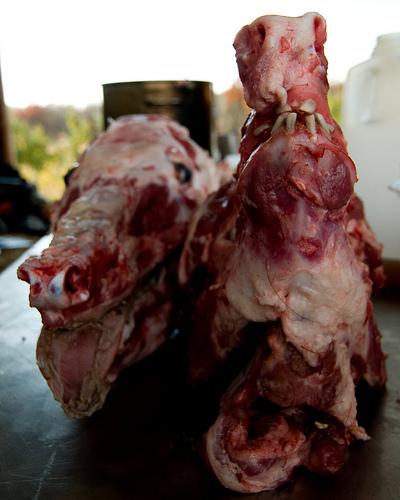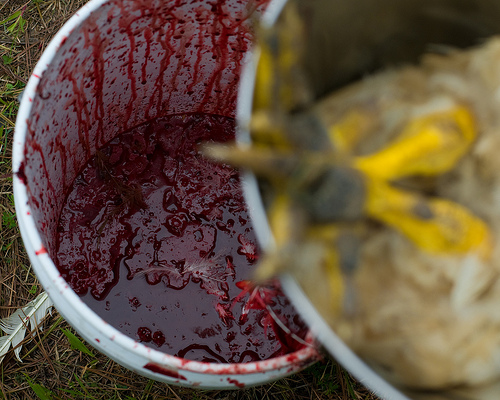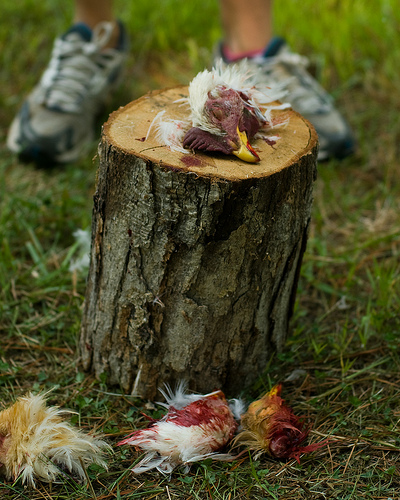The eyes of food
I grew up knowing that November meant there would be a deer hanging somewhere in the front yard, probably by the antlers or the neck and probably from the branch of a tree. Or maybe hanging out of the bed of the pickup truck. Or from a rafter in the dirt floor garage.
I knew that the stories of how that big buck came to be dead would be floating around the house until they could be recited, with all the groan inducing embellishments, by people in the house who were trying hard not to listen. I could probably dig deep enough to remember one or two of those stories, but who gives a shit really?
My grandfather also told stories, the ones that I have forgotten, the ones about how the deer tricked him or showed him up or maybe never even existed. He never seemed to be about the perceived glory of shooting something in the face; when a deer was in the freezer before December he seemed satisfied with the knowledge that, with the deer’s help, he and his family would have food for the Winter. He didn’t regale in the winners and losers of what most sane people would see as a wholly lopsided conflict heavily subsidized by civilization and its tools – a heavily armed human against an unprepared, unwilling and unaware opponent.
My grandfather’s task was brutal regardless, but maybe less so as there were no mounted heads on the walls of his home like there were in our home. The need for those stuffed and preserved reminders is something that I couldn’t explain back then, but know now is an indication of small mindedness, a dedication to the outward projection of dominance when you know that you are inescapably weak inside. You are a collector with no sense of how to interact with the dead or the living, both phases of life simply reminders of inadequacy, weak interpersonal skills and low self esteem. If you have a deer head or a stuffed fish on your wall, go look at it and ask yourself what reminder it serves that could not otherwise be captured by a photograph or poem. Is it there to show your friends and family what a hero you are?
When I was younger, I volunteered twice to travel with a New York DEC deer ager on their rounds. For fourteen hours we visited deer processing places as well as any house that had a deer hanging in the front yard. My job was to write while the ager examined teeth and called out the ages of each dead deer.
I think it was during this time that I became permanently desensitized to the sights and smells of dead non-human animals. At each processor were dozens of barrels and drums and tarps full of various parts; piles of legs next to buckets of guts and tails; lines of deer carcasses waiting to be disassembled by hacksaws, band saws and reciprocating saws, mostly frozen in rigor mortis or by the depth of cold in the evening air. Steam escaped from some of the recent arrivals, a sign that they were less than an hour dead.
*****
There can be nothing more brutal or common or necessary than taking a life in order to eat and sustain a body. Non-human animals do it without question, without any perceptible remorse or hesitation. What makes our actions so much different?
We pull carrots from the soil, ending their run from gravity, ending their gathering of sugar and all the processes that made them a living thing. They may not scream or run or struggle much, but a carrot is a living thing nonetheless and we must kill it in order to eat it.
Eating a carrot is nothing like eating an animal, which is why many choose not to eat the latter at all. I respect that choice; it was a choice that I had once made as well. As with eating it, killing a carrot is nothing like killing an animal. Animals articulate their disappointment in our choice to kill them in blood gurgles, screams and the twitches of ending nerve impulses. We destroy them in order that we can live; we destroy them for other reasons as well, reasons that have no bearing on survival. If you do not believe that then you deny that your meal had any previous life beyond its packaging. I apologize, but I can’t let you do that.



December 12, 2009 at 10:30 am
Another outstanding piece, beautifully knitting a wide range of thoughts and feelings about how we choose to think about our food!
I too, have seen life drain from the eyes of animals who were killed so that I might live. I have experienced the range of emotions involved in transforming carcass into meat – from sorrow, to revulsion, to scientific objectivity, to mind-numbing work, to pride. I know how it feels to butcher, grind, can and freeze meat which would feed me until next year’s harvest.
I’ve since drifted away from a meat-based diet and consider myself lucky that my body functions well on beans, grains and vegetables. I like to think that my ecological footprint is smaller than it was when I ate meat. Inspired by “Diet for a Small Planet” I decided it would be more efficient to eat lower on the food chain. Rather than feed protein to animals, I skip the middleman and feed those calories to myself.
On the other hand, I have work to do reining in the distance traveled by some of my food. Obvious targets would be the olive oil from Greece and the coconut milk from Thailand that I can’t seem to do without. And then there’s the Midwestern soybeans and California Vegenaise.
Your writings reaffirm my decision to eat locally grown food and support my farmer friends as they expand into beans, wheat and rice. You are, as always, an inspiration!
December 18, 2009 at 5:52 pm
Thank you bro! I have never understood why we always seem to have to declare that we think we are so superior to the animals that feed us. It is why I groan during the fall as our local airport and grocery stores are filled with arrogant, camo-wearing Americans and Germans who paid absurd amounts of money to hunt (and I use that term loosely as they pay someone with extensive backcountry experiences to GUIDE them to the animals like big-horn sheep) and shoot an animal as trophy so that they can go back and brag to their friends as they break out the ruler stick and measure their manhood. It’s sick!
December 22, 2009 at 10:16 am
Wow, insightful post. I often wonder if those carrots we pull from the ground actually do scream, but we just don’t hear it. I wrote a post a few weeks ago about hunting and how I feel about it as a vegetarian…If you have the time, here’s the http://foodfitnessfreshair.wordpress.com/2009/11/30/open-fire-opening-day/
December 28, 2009 at 2:34 pm
So many things about this post are great.